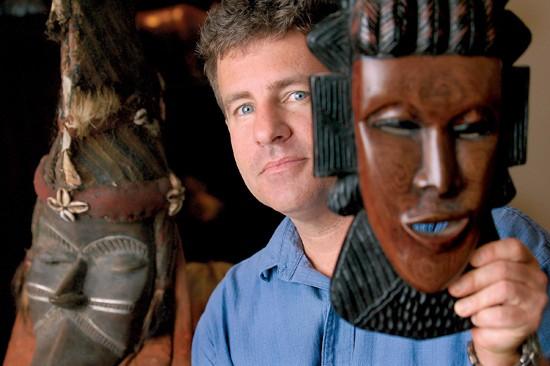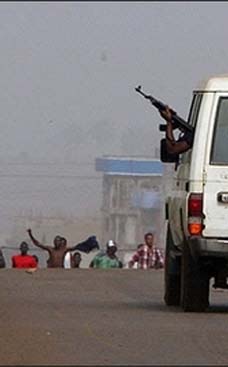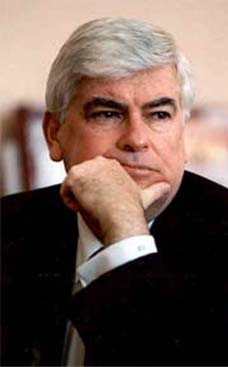
The Liberian Forestry Initiative came about as a means of re-establishing a viable and responsible industry, as the country operated under a shaky interim government. While the initiative is driven by a U.S. Forest Service team, it is funded by the State Department with the cooperation of the United Nations. The program is aimed at establishing laws and regulations and a general framework for managing Liberia's forests. Krueger said he was tapped for the program because he had worked on a community forestry project in Senegal in 2004, and had served in the Peace Corps in Nepal in the early 1990s. He first went to Liberia in April 2005 and has been back three times since, most recently in December. Krueger said there has been progress in rebuilding the country's timber industry, and a big part of it is due to the relative stability that's developed since last year, when a competent, Harvard-educated president was elected, Ellen Johnson-Sirleaf. "Right now, the industry is completely unregulated," he said. But many of the pieces are falling in place for an organized, regulated timber industry to start up soon. And there is pressure for Krueger and his fellow advisers to make it happen. "There is a lot of pressure on the Forest Service to get this sector back up and running," Krueger said. "People want to know, where are the logs, where is the revenue?" The old contracts have all been nullified and new ones will be issued under a system that will more closely monitor the movement of products. A "chain of custody" system is being developed to track logs from the stump all the way to their export destination.
Nepal RPCV Joe Krueger has been to Liberia four times in the past two years as part of a program that is drawing on skills from the U.S. Forest Service to restore Liberia's timber industry
Forester helps Liberian timber effort
By The Associated Press
Caption: Flathead National Forest environmental coordinator Joe Krueger, who has been to the war-torn West African country of Liberia four times in the last two years, poses at his home in Kalispell with a couple of West African masks he brought back for his three children. Krueger has been working on a Forestry Initiative that will help to restore Liberia's timber industry.
KALISPELL - The timber industry is a wreck in the basket-case West African country of Liberia, and an official from the Flathead National Forest has been working to fix it.
Joe Krueger, who manages appeals and litigation for the forest, has been to Liberia four times in the past two years as part of a program that is drawing on skills from the U.S. Forest Service to restore Liberia's timber industry.
The story of how that industry was destroyed has all the worst elements one could imagine - civil war, child soldiers, murderous militias and one of the most infamous African dictators in history.
Krueger, of Kalispell, landed in Liberia at the end of that story line, after most of the damage was complete.
What he found was a country where nearly every structure is pocked with holes from rocket-propelled grenades and bullets.
"There is no running water, there is no electricity in most places," Krueger said. "All of the buildings have bullet holes in them. All of them."
"You see the effects of war there on a daily basis," Krueger said. "There are a lot of amputees. I've seen soccer games where the players are amputees."
Even the American Embassy carries battle scars from the civil war that raged on from 1990 to 1997. "This is the most-evacuated embassy out of all of our embassies," Krueger said.
On his first visit, a riot erupted outside the embassy, and Krueger was ushered into a blockaded section of the building that was guarded by U.S. Marines.
Liberia's civil war erupted in 1990 after the fall of former dictator Samuel Doe. It carried on until 1997, when Charles Taylor emerged as the victorious warlord and was elected president by a populace that wanted an end to the violence.
But the fighting carried on for the next six years as rival factions battled over possession of the country's rich natural resources.
The Taylor regime and his rivals issued timber contracts, sometimes competing for the same forests and trees, with revenues from the raw log exports used to fund their enforcement militias.
Krueger said the contracts, called "concessions rights," were issued for 26 million acres even though there are only about 10 million acres of forest lands in Liberia.
Charles Taylor eventually lost to his rivals and was forced into exile in 2003, the same year that international sanctions were imposed on all Liberian timber exports.
The industry came to an abrupt end, other than localized, illegal logging.
The Liberian Forestry Initiative came about as a means of re-establishing a viable and responsible industry, as the country operated under a shaky interim government.
While the initiative is driven by a U.S. Forest Service team, it is funded by the State Department with the cooperation of the United Nations. The program is aimed at establishing laws and regulations and a general framework for managing Liberia's forests. Krueger said he was tapped for the program because he had worked on a community forestry project in Senegal in 2004, and had served in the Peace Corps in Nepal in the early 1990s.
He first went to Liberia in April 2005 and has been back three times since, most recently in December.
Krueger said there has been progress in rebuilding the country's timber industry, and a big part of it is due to the relative stability that's developed since last year, when a competent, Harvard-educated president was elected, Ellen Johnson-Sirleaf. Charles Taylor, meanwhile, was arrested last year and now faces war-crime charges at The Hague, Netherlands.
The U.N. Security Council mission for the Liberian Forestry Initiative is to "ensure that government revenues from the timber industry are used to the benefit of the Liberian people."
That translates to a need for strict accountability as the industry is rebuilt, Krueger said.
"Right now, the industry is completely unregulated," he said.
But many of the pieces are falling in place for an organized, regulated timber industry to start up soon. And there is pressure for Krueger and his fellow advisers to make it happen.
"There is a lot of pressure on the Forest Service to get this sector back up and running," Krueger said. "People want to know, where are the logs, where is the revenue?"
The old contracts have all been nullified and new ones will be issued under a system that will more closely monitor the movement of products. A "chain of custody" system is being developed to track logs from the stump all the way to their export destination.
The country's forests, which look like fields of broccoli from the air, Krueger said, are lush with high-value hardwoods such as teak, ebony and mahogany.
Establishing a stable, accountable industry could eventually attract international investment to rebuild the country's ability to produce value-added wood products, rather than simply exporting raw logs.
The country's entire milling capacity was destroyed during the civil war, Krueger said, citing the example of a $50 million plywood mill that was "completely torched" just two years after it was built by a Malaysian company. Not surprisingly, interest in investment evaporated, and it is only recently returning because of the orderly business environment that's being developed through the Liberian Forestry Initiative.
"There are a lot of international companies that are interested in getting back into the timber trade business in Liberia," Krueger said.
The adventure has been worthwhile, he said, because there is tangible progress in rebuilding the Liberian timber industry.
It's been a rewarding endeavor because it's putting solid Forest Service skills to work, he added.
"We have such high-quality skills that we can bring to bear," he said. "That's why I'm such a big believer in Forest Service involvement over there."
Copyright © 2007 Associated Press. All rights reserved. This material may not be published, broadcast, rewritten, or redistributed.
Published on Wednesday, February 14, 2007.
Last modified on 2/13/2007 at 11:58 pm
Copyright © The Billings Gazette, a division of Lee Enterprises.


















